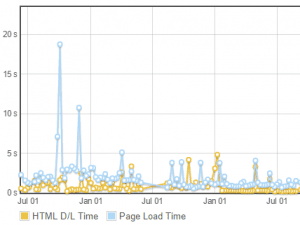Disclosure: This post has affiliate links. I earn a commission at no extra cost to you. I only recommend products I personally believe in. More info on my Privacy Policy page.
Why You Need Fast Website Loading Speeds In 2015
Table of Contents
The internet has come an extremely long way since the 1990s – and not just in time alone. Gone are the days of waiting minutes for a simple picture to load, and users of YouTube at its genesis in 2005 will remember having to leave a video to buffer for minutes on end before you would be able to even play a few seconds of footage. Thanks to a number of huge advances in technology and the way in which we view content online in the past decade alone, there is very little chance that you will find a website which can’t provide you with content within a few seconds of you having clicked their link. Website loading speeds is almost an alien concept – and that’s an amazing thought.
Therefore, it’s more important than ever – moreover essential – that your website, no matter what engine it may run on, and no matter what content you may have for the world to see, is able to provide content fully and quickly to be able to keep up with both technology and consumer expectation. As more and more people are moving away from using the internet on fixed desktop locations and even bulky laptops to mobile devices such as smartphones and tablets, if your website doesn’t recognise the importance of these trends, then you could well suffer as a result.
The Statistics
Kissmetrics offers a handy info-graphic identifying some of the key statistics that show website loading times to be an essential component of any online operation. They discuss that, as take-up of mobile browsing has steadily increased, patience when using the internet has likewise dwindled. This is perhaps understandable – their infographic interestingly points out that mobile users expect websites to load just as easily andefficiently as they would on a desktop PC – despite the memory difference being hugely variable.

GTmetrix graph showing website speed over time.
It’s also clear that no one should underestimate the power of the ‘abandon rate’. This is, simply put, the likelihood of someone leaving your website before it’s even loaded. It’s incredible to think that our patience can now be gauged on the sheer amount of seconds it takes us to skip off a page, but the statistics ring true – how often have you attempted to access a website, been unable to for more than ten seconds and have assumed that there is either a problem with your device or your internet connection? Website loading speeds do indeed have this much of an effect on the way we browse. In a lot of ways, the superfast broadband world we live in has perhaps made us a little bit spoiled in this regard – but as 4G continues to impress and grow ever larger around the world, there is no reason for anyone to need to wait any longer than a few seconds for a webpage to load. Anyone having used the internet in its infancy may find this a bizarre notion, but Kissmetrics’ statistics are clear – there is a large spike of users abandoning web pages in the first ten seconds of loading. If your website doesn’t load at least its main content within this time, you’re likely to lose a lot of traffic. Google Developers and GTmetrix are particulaly useful tools for helping to measure your website’s speed.
The Mobile User
It appears that content on the internet is therefore now being influenced more by mobile users than those accessing via a PC, and trends show that this is only likely to continue. Kissmetrics discusses that 73% of users have experienced extremely slow speed via mobile, and it’s posited that every second of unwanted loading accounts for 16% of potential target users via mobile. People expect your page to load quickly – and with so much discussion and availability of high speed internet, it’s hard to blame why they feel this way. Website loading speeds are big business.
It’s said that 4G will expand to swallow up around 90% of mobile internet traffic by the end of the decade. This is absolutely staggering news for anyone currently operating a website plagued by bugs and loading problems, and it’s yet another indication that those who find difficulty harnessing traffic now will most certainly be experiencing major problems in a few years’ time.
While website loading speeds are clearly a top priority, it’s also important to bear in mind the readability and appearance of content on mobile devices. If your website is not optimised to be read on a smaller screen, you are likely to be cutting off a large share of your potential reading audience. Almost all public service, news and business websites have ‘mobile versions’ of their main pages, allowing for easy small-screen reading, scrolling and access to features. They’re optimised for quick loading, small reads and ideal for anyone having a short browse on public transport or on the move.
You need to ask yourself if your website or online presence is ready for the mobile internet boom – if it isn’t, it’s possible that you’re already struggling. But there’s no reason in giving up – as there is always a solution to both making your content ready and easy for mobiles to consume and to allow for even faster website loading speeds.
SEO CoPilot
 SEO CoPilot is home to a team of dedicated web design experts who understand and digest the latest trends and projections in internet browsing – and we like to use this to our clients’ advantage. Where we may be confronted with a website in need of content reconstruction or a page in need of an SEO overhaul, we may also be consulted regarding mobile accessibility and website loading speeds. Luckily for our clients, we’re willing and able to offer solid solutions to both design and accessibility concerns at very affordable rates.
SEO CoPilot is home to a team of dedicated web design experts who understand and digest the latest trends and projections in internet browsing – and we like to use this to our clients’ advantage. Where we may be confronted with a website in need of content reconstruction or a page in need of an SEO overhaul, we may also be consulted regarding mobile accessibility and website loading speeds. Luckily for our clients, we’re willing and able to offer solid solutions to both design and accessibility concerns at very affordable rates.
If your website, blog or online presence is suffering from low traffic, or if website loading speeds are plaguing the running of your page regularly, consider contacting us today and we’ll be able to offer a range of options and tools to help prepare you and your readers for the 4G revolution. We’ll even be able to help turn your traffic woes around and make sure you have a fantastic looking page design ready for any device – mobile, desktop, or even wearable tech.
